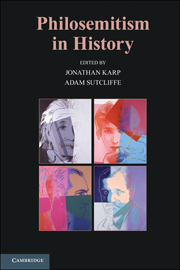Book contents
- Frontmatter
- Contents
- Notes on Contributors
- Introduction
- PART I MEDIEVAL AND EARLY MODERN FRAMEWORKS
- 1 Philosemitic Tendencies in Medieval Western Christendom
- 2 The Revival of Christian Hebraism in Early Modern Europe
- 3 The Philosemitic Moment?
- PART II THREE EUROPEAN PHILOSEMITES
- PART III THE CULTURAL POLITICS OF PHILOSEMITISM IN VICTORIAN BRITAIN AND IMPERIAL GERMANY
- PART IV AMERICAN PHILOSEMITISMS
- PART V PHILOSEMITISM IN POST-HOLOCAUST EUROPE
- Index
- References
3 - The Philosemitic Moment?
Judaism and Republicanism in Seventeenth-Century European Thought
Published online by Cambridge University Press: 05 June 2012
- Frontmatter
- Contents
- Notes on Contributors
- Introduction
- PART I MEDIEVAL AND EARLY MODERN FRAMEWORKS
- 1 Philosemitic Tendencies in Medieval Western Christendom
- 2 The Revival of Christian Hebraism in Early Modern Europe
- 3 The Philosemitic Moment?
- PART II THREE EUROPEAN PHILOSEMITES
- PART III THE CULTURAL POLITICS OF PHILOSEMITISM IN VICTORIAN BRITAIN AND IMPERIAL GERMANY
- PART IV AMERICAN PHILOSEMITISMS
- PART V PHILOSEMITISM IN POST-HOLOCAUST EUROPE
- Index
- References
Summary
The early seventeenth century witnessed the simultaneous rise of the economic fortunes of European Jewry and of Christian scholarly interest in Jewish texts. Increasingly valued as facilitators of international trade by states and rulers guided by mercantilist economics and raison d'Etat pragmatism, Jews extended their geographical presence and deepened their commercial importance, particularly during the turmoil of the Thirty Years' War. Christian Hebraism, meanwhile, having emerged as a facet of Renaissance humanism, and invigorated by the theological rivalries of the post-Reformation era, reached its intellectual high-water mark in the second quarter of the seventeenth century. In Jonathan Israel's words, “philosemitic scholarship was … born at the same moment, and in the same context, as philosemitic mercantilism.”
What, though, was the relationship between these two phenomena? Or, to pose this question slightly differently, what were the politics of seventeenth-century Christian intellectual engagement with Jews and their texts, and in what sense, and to what extent, is it appropriate to consider this endeavor “philosemitic”? The expansion of Jewish settlement from the mid-sixteenth to the mid-seventeenth century – around the North Sea, in Italy and central Europe, and, slightly later, in colonial settlements around the Caribbean – was overwhelmingly driven by commercial motives. However, this expansion placed practical issues related to Jewish settlement on the intellectual agenda, and in these debates economics, politics, and theology inescapably intertwined.
- Type
- Chapter
- Information
- Philosemitism in History , pp. 67 - 90Publisher: Cambridge University PressPrint publication year: 2011
References
- 5
- Cited by



